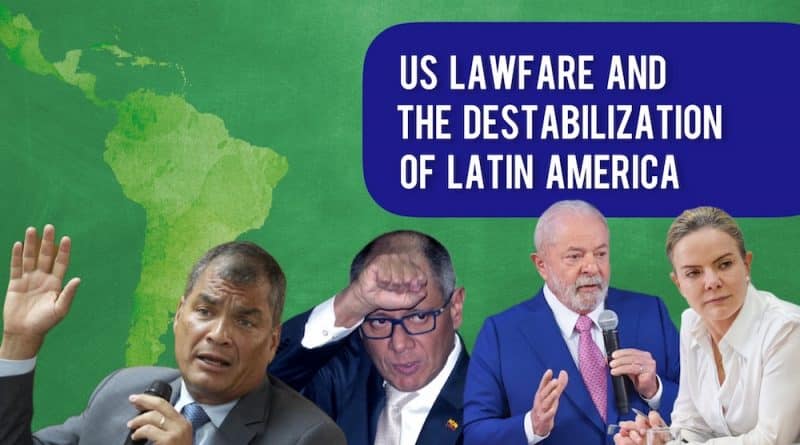Lawfare and the Destabilization of Latin America
By Brian Mier, TeleSur – Brazil
Ed. Note: Excerpted for length

Lawfare is the weaponized use of the law to annihilate a political or business enemy. Common tactics used in Lawfare include: forum shopping, as when public prosecutors transfer a case to a jurisdiction with a friendly judge; excessive use and abuse of coerced plea bargain testimonies which are often the only evidence presented; suppressing evidence beneficial to the defense; and close collaboration with the media to create a public spectacle.
There are indications that Lawfare was piloted in the US before being rolled out through Latin America. In July, 2008, the US Department of Justice (DOJ) filed corruption charges against Senator Ted Stevens (R/AK) for allegedly receiving illegal reforms on a vacation property, damaging his reputation and causing him to lose his first election in over 36 years. Like future cases in Latin America, no material evidence was presented, just a coerced plea bargain testimony by a man who was trying to get out of jail. Months after the election, Stevens was ruled innocent.
Originally described as a weaponized use of international human rights law, the Pentagon’s 2005 National Defense Strategy referred to law as “the weapon of the weak who use international legal cases and terrorism to usurp America.” Military strategists soon began suggesting that Lawfare could be more than just defensive, it could also benefit national security, being preferable to expensive and destructive forms of war. More neutral definitions of the term began to emerge. Gen. Charles Dunlap later wrote that Lawfare could be converted into a “strategy of using or misusing law as a substitute for traditional military means to achieve military objectives.”
Lawfare can be used against any political enemy from across the political spectrum. Three right wing former Presidents of Peru were sentenced to prison due to coerced plea bargain testimonies by corrupt, imprisoned Brazilian businessmen, with former President Alan Garcia committing suicide on the day they were coming to arrest him.
In April 2020, an Ecuadoran kangaroo court sentenced Rafael Correa to eight years in prison and barred him from future office based in part on coerced plea bargain testimony. With Ecuador currently in chaos, the former President has been living in political exile in Belgium since 2017.
In June 2018, a judge in El Salvador issued a warrant for former President Mauricio Funes and 30 top members of the FMLN, based on coerced plea bargain testimony from corrupt businessmen who received sentence reductions and partial retention of their illicit assets in exchange. Already living in Nicaragua, they were unable to arrest Funes; he lives there to this day.
Although frivolous criminal investigations against politicians and business leaders as tactics to gain an upper hand has certainly been engaged in as long as politics and business have existed, the concept of Lawfare as a hybrid war tactic really began after 2008. The toxic legacy of this imperialist strategy is seen in the local initiatives that use similar Lawfare tactics to annihilate political enemies such as Argentina’s Vice President Cristina Kirchner. With a new round of electoral victories of the working class left in Latin America, it is more important than ever to develop defense strategies against Lawfare.
Source: Kawsachin News, 1/25/23
